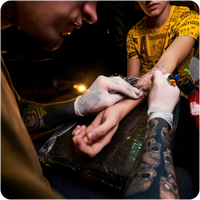Het arrangement Culture v456 is gemaakt met Wikiwijs van Kennisnet. Wikiwijs is hét onderwijsplatform waar je leermiddelen zoekt, maakt en deelt.
- Auteur
- Laatst gewijzigd
- 28-11-2025 12:02:26
- Licentie
-
Dit lesmateriaal is gepubliceerd onder de Creative Commons Naamsvermelding-GelijkDelen 4.0 Internationale licentie. Dit houdt in dat je onder de voorwaarde van naamsvermelding en publicatie onder dezelfde licentie vrij bent om:
- het werk te delen - te kopiëren, te verspreiden en door te geven via elk medium of bestandsformaat
- het werk te bewerken - te remixen, te veranderen en afgeleide werken te maken
- voor alle doeleinden, inclusief commerciële doeleinden.
Meer informatie over de CC Naamsvermelding-GelijkDelen 4.0 Internationale licentie.
Het thema 'Culture' (v456) is ontwikkeld door auteurs en medewerkers van StudioVO.
Fair Use
In de Stercollecties van StudioVO wordt gebruik gemaakt van beeld- en filmmateriaal dat beschikbaar is op internet. Bij het gebruik zijn we uitgegaan van fair use.
Meer informatie: Fair use
Mocht u vragen/opmerkingen hebben, neem dan contact op via de
helpdesk VO-content.
Aanvullende informatie over dit lesmateriaal
Van dit lesmateriaal is de volgende aanvullende informatie beschikbaar:
- Toelichting
- Dit thema valt onder de arrangeerbare leerlijn van de Stercollectie voor Engels voor vwo, leerjaar 4, 5 en 6. Dit is thema: 'Culture'. Dit thema omvat de volgende volgende onderwerpen: - Cultural appropriation - The meaning of culture - Conspiracy Theorist's world - An art dealer
- Leerniveau
- VWO 6; VWO 4; VWO 5;
- Leerinhoud en doelen
- Engels;
- Eindgebruiker
- leerling/student
- Moeilijkheidsgraad
- gemiddeld
- Studiebelasting
- 20 uur 0 minuten
- Trefwoorden
- an art dealer, arrangeerbaar, conspiracy theorist's world, cultural appropriation, culture, engels, stercollectie, the meaning of culture, v456
Gebruikte Wikiwijs Arrangementen
VO-content Engels. (2020).
Conspiracy Theories v456
VO-content Engels. (2020).
Culture appropiation v456
VO-content Engels. (2020).
Meaning of culture v456

 Culture
Culture What do you need to know?
What do you need to know?

 Introduction - Cultural appropriation
Introduction - Cultural appropriation


 Think about your morning routine – from the time you wake up to the time you leave the house. How many objects/foods do you interact with are not from your home country?
Think about your morning routine – from the time you wake up to the time you leave the house. How many objects/foods do you interact with are not from your home country? You are going to watch two videos about cultural appropriation.
You are going to watch two videos about cultural appropriation. In Step 1 you read the first paragraph of this article.
In Step 1 you read the first paragraph of this article. We can use a prefix to make a word (negative)
We can use a prefix to make a word (negative) You notice that your friend, Filipa, on Instagram has started wearing her hair in cornrows, and adopting other cultural symbols that you know that some people will find offensive.
You notice that your friend, Filipa, on Instagram has started wearing her hair in cornrows, and adopting other cultural symbols that you know that some people will find offensive.
 What have you learnt in this period?
What have you learnt in this period? Introduction
Introduction
 Have you heard of ‘café culture’? What does it mean?
Have you heard of ‘café culture’? What does it mean? The Meaning of Culture
The Meaning of Culture

 Read these questions. Think about how you will answer them.
Read these questions. Think about how you will answer them. Writing a poster
Writing a poster Conspiracy Theorist's World
Conspiracy Theorist's World
 What do you know about the following conspiracy theories?
What do you know about the following conspiracy theories? So why do people believe in conspiracy theories?
So why do people believe in conspiracy theories? You are going to hear part of a radio interview with a woman called Gabby Potter. She works for an online magazine called Believe it or not! which has become very successful in a short period of time.
You are going to hear part of a radio interview with a woman called Gabby Potter. She works for an online magazine called Believe it or not! which has become very successful in a short period of time. Let’s focus on ...past modals.
Let’s focus on ...past modals.
 An art dealer
An art dealer
 Read these questions about tattoos.
Read these questions about tattoos.
 Let’s look at ... future perfect continuous.
Let’s look at ... future perfect continuous. Look at the following statements. What do you think? Answer the questions in your notebook and discuss with a classmate.
Look at the following statements. What do you think? Answer the questions in your notebook and discuss with a classmate.
 If your school participates in VO-content, you can practice with the English practice program 'Oefenprogramma Engels'.
If your school participates in VO-content, you can practice with the English practice program 'Oefenprogramma Engels'.
